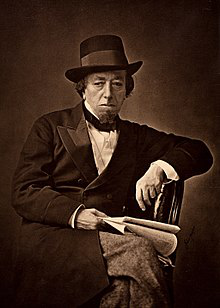

Prime Minister of the United Kingdom
Benjamin D'Israeli 21 December 1804 Bloomsbury, Middlesex, England
19 April 1881(1881-04-19) (76) Mayfair, London, England
20 February 1874 – 21 April 1880
Former Prime Minister of the United Kingdom "Disraeli" redirects here. For other uses, see Disraeli (disambiguation). The Right Honourable The Earl of Beaconsfield KG PC FRS Photo by Cornelius Jabez Hughes, 1878Prime Minister of the United KingdomIn office 20 February 1874 – 21 April 1880MonarchVictoriaPreceded by William Ewart GladstoneSucceeded by William Ewart GladstoneIn office 27 February 1868 – 1 December 1868MonarchVictoriaPreceded by The Earl of DerbySucceeded by William Ewart GladstoneChancellor of the ExchequerIn office 6 July 1866 – 29 February 1868MonarchVictoriaPrime Minister The Earl of DerbyPreceded by William Ewart GladstoneSucceeded by George Ward HuntIn office 26 February 1858 – 11 June 1859MonarchVictoriaPrime Minister The Earl of DerbyPreceded by Sir George Cornewall LewisSucceeded by William Ewart GladstoneIn office 27 February 1852 – 17 December 1852MonarchVictoriaPrime Minister The Earl of DerbyPreceded by Charles WoodSucceeded by William Ewart GladstoneLeader of the OppositionIn office 21 April 1880 – 19 April 1881MonarchVictoriaPrime Minister William Ewart GladstonePreceded by The Marquess of HartingtonSucceeded by The Marquess of SalisburyIn office 1 December 1868 – 17 February 1874MonarchVictoriaPrime Minister William Ewart GladstonePreceded by William Ewart GladstoneSucceeded by William Ewart Gladstone Personal detailsBornBenjamin D'Israeli (1804-12-21 ) 21 December 1804 Bloomsbury, Middlesex, EnglandDied19 April 1881(1881-04-19) (aged 76) Mayfair, London, EnglandPolitical partyConservativeSpouse(s)Mary Anne Lewis (m. 1839 ; died 1872 )Parents Isaac D'Israeli Maria Basevi SignatureWriting careerNotable works List Vivian Grey Popanilla The Young Duke Contarini Fleming Ixion in Heaven The Wondrous Tale of Alroy The Rise of Iskander The Infernal Marriage Henrietta Temple Venetia Coningsby Sybil Tancred Lothiar Endymion Part of the Conservatism seriesOne-nation conservatism Ideas Conservatism Pragmatic Paternalism Social policy Solidarity Organicism Subsidiarity Morality Responsibility Welfare Dignity Communitarianism Humanism Distributism Noblesse oblige Big Society Progressive People Benjamin Disraeli Edmund Burke Lord Randolph Churchill Stanley Baldwin Harold Macmillan Rab Butler David Cameron Theresa May Boris Johnson Documents Sybil, or The Two Nations Coningsby, or The New Generation Industrial Charter Organisations Conservative Party Tory Reform Group Bright Blue Conservatism portal Politics portal United Kingdom portalvte Benjamin Disraeli, 1st Earl of Beaconsfield KG PC FRS (21 December 1804 – 19 April 1881) was a British statesman and Conservative politician who twice served as Prime Minister of the United Kingdom. He played a central role in the creation of the modern Conservative Party, defining its policies and its broad outreach. Disraeli is remembered for his influential voice in world affairs, his political battles with the Liberal Party leader William Ewart Gladstone, and his one-nation conservatism or "Tory democracy". He made the Conservatives the party most identified with the glory and power of the British Empire. He is the only British prime minister to have been of Jewish birth. He was also a novelist, publishing works of fiction even as prime minister. Disraeli was born in Bloomsbury, then a part of Middlesex. His father left Judaism after a dispute at his synagogue; young Benjamin became an Anglican at the age of 12. After several unsuccessful attempts, Disraeli entered the House of Commons in 1837. In 1846 the prime minister at the time, Sir Robert Peel, split the party over his proposal to repeal the Corn Laws, which involved ending the tariff on imported grain. Disraeli clashed with Peel in the House of Commons. Disraeli became a major figure in the party. When Lord Derby, the party leader, thrice formed governments in the 1850s and 1860s, Disraeli served as Chancellor of the Exchequer and Leader of the House of Commons. Upon Derby's retirement in 1868, Disraeli became prime minister briefly before losing that year's general election. He returned to the Opposition, before leading the party to winning a majority in the 1874 general election. He maintained a close friendship with Queen Victoria, who in 1876 elevated him to Earl of Beaconsfield. Disraeli's second term was dominated by the Eastern Question—the slow decay of the Ottoman Empire and the desire of other European powers, such as Russia, to gain at its expense. Disraeli arranged for the British to purchase a major interest in the Suez Canal Company in Egypt. In 1878, faced with Russian victories against the Ottomans, he worked at the Congress of Berlin to obtain peace in the Balkans at terms favourable to Britain and unfavourable to Russia, its longstanding enemy. This diplomatic victory over Russia established Disraeli as one of Europe's leading statesmen. World events thereafter moved against the Conservatives. Controversial wars in Afghanistan and South Africa undermined his public support. He angered British farmers by refusing to reinstitute the Corn Laws in response to poor harvests and cheap imported grain. With Gladstone conducting a massive speaking campaign, his Liberals defeated Disraeli's Conservatives at the 1880 general election. In his final months, Disraeli led the Conservatives in Opposition. He had written novels throughout his career, beginning in 1826, and he published his last completed novel, Endymion, shortly before he died at the age of 76.

We use cookies
We use cookies and other tracking technologies to improve your browsing experience on our website, to show you personalized content and targeted ads, to analyze our website traffic, and to understand where our visitors are coming from. Privacy Policy.